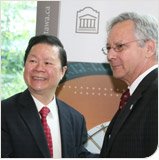Between January 16, 2014, and March 11, 2014, six more rulings of the Information and Privacy Commissioner for Ontario have been released against the University of Ottawa.
No other university in Ontario has so many violations of access to information law.
Here is the list for that period alone:
Order PO-3294: University ordered to disclose all the records to the individual.
Order PO-3298: University ordered to require a named doctor to perform a search.
Order PO-3302: Adjudicator does not uphold the University's application for its exclusion on the alleged basis of "employment or labour relations".
Order PO-3312: University ordered to disclose 20 records that it was withholding.
Order PO-3314: University ordered to disclose 50% of the records that it was withholding.
Order PO-3318: University ordered to disclose all the responsive information in the withheld records.
To me, this suggests an institutional disregard for the law of access to information.
In my opinion, instead of using its discretion to promptly provide access to requested information, the university appears to be using constructive attempts to avoid its statutory obligations, and appears willing to fight lengthy and costly appeals to prevent being transparent with its students and the public.
It's not winning the appeals. But it is delaying fair access. Rather than using the law primarily to protect the privacy of individuals, the university is using the law to shield itself against needed institutional transparency.
As a result, individuals are being prevented from accessing their own personal information generated by and/or kept by the university, while others see their information improperly disclosed to political opponents.
Certainly an area where the U of O stands out. A culture of political-party-style management darkness coupled with irresponsible refusals to protect the information of its students and professors. For example, THIS, and THIS.
More to come before that particular culture changes... stay tuned.








